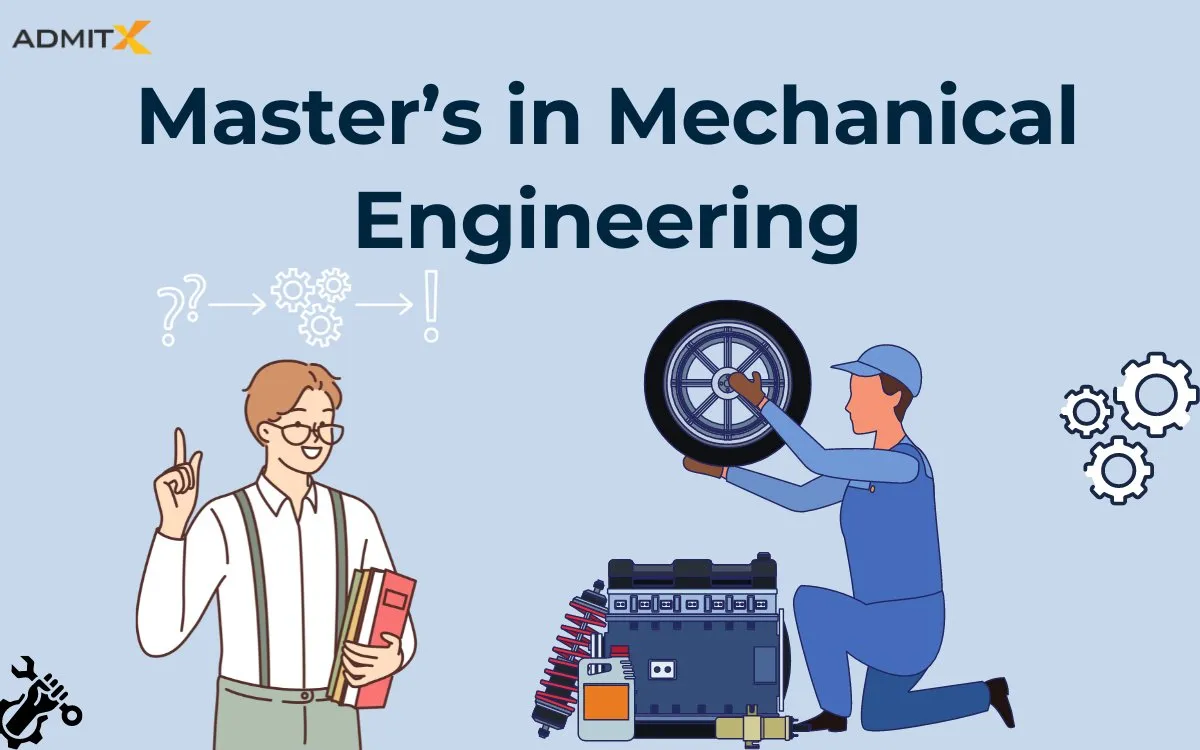
Master’s in Mechanical Engineering: Top Universities, Fees, Recruiters & More
Master’s in Mechanical Engineering is a one-year specialisation degree that offers practical knowledge in advanced mechanics, design and manufacturing, material science, etc. Students get an opportunity to establish extensive links with companies like Jaguar, Land Rover & Siemens. The field experiences gained from the course help students begin their journey into the world of machines and automobiles.
The blog underscores the best universities, top recruiters, salaries, and career scope after a master’s in mechanical engineering.
- Why Pursue a Master’s in Mechanical Engineering?
- What are the Top Universities for Master’s in Mechanical Engineering?
- Syllabus of Master’s in Mechanical Engineering
- Entry Requirements for Master’s in Mechanical Engineering
- Career Opportunities after Master’s in Mechanical Engineering
- How to Apply for a Master’s in Mechanical Engineering
- Conclusion
- FAQs
Why Pursue a Master’s in Mechanical Engineering?
A Master’s in Mechanical Engineering allows students to enhance their technical expertise and learn strategies for leading teams and managing projects. The degree focuses on strengthening the foundation of the manufacturing process, energy system and control, etc. Some of the reasons for pursuing a master’s in mechanical engineering are listed below:
- The broad-based curriculum offers knowledge in robotics, design fluid mechanics, and aerodynamics.
- The comprehensive syllabus helps students sharpen their skills and expertise through research and dissertations.
- The specialisation in mechatronics, computational mechanics, and nanotechnology provides theoretical knowledge blended with applications and technologies.
- The STEM framework opens doors to engineering career opportunities and enhances the career scope.
- The course helps students learn from industry professionals and competent professors who help in training, research, and placements.
What are the Top Universities for Master’s in Mechanical Engineering?
The best universities in the world offer international exposure and edge the students’ career prospects. The rankings, duration, and fee information help students make an informed decision. Some of the top universities for master’s in mechanical engineering are MIT, the University of Manchester, and the University of Melbourne: Arizona State University, Columbia University, and many more. The table below gives a detailed idea of some of the best universities worldwide.
| University | Course Name | QS Ranking | Duration | |
|---|---|---|---|---|
| University of Manchester | MSc in Mechanical Engineering Design | 24 | 1 year | £35,000 (INR 38,02,407) |
| University of Melbourne | Master of Mechanical Engineering | 59 | 3 years | AUD 191,928 (INR1,08,15,079) |
| Columbia University | Masters of Mechanical Engineering | 44 | 1-1.5 years | $63,000 (INR 52,74,643) |
| University of Glasgow | MSc in Mechanical Engineering & Management | 134 | 1 year | £31,860 (INR 33,67,846) |
| Massachusetts Institute of Technology (MIT) | MEng in Mechanical Engineering | 1 | 1 year | $83,405 (INR 69,77,353) |
Syllabus of Master’s in Mechanical Engineering
The syllabus of the master’s in mechanical engineering is divided into 2 modules: compulsory & optional. The compulsory modules are the mandatory subjects, while the optional modules refer to the subjects taught along with the compulsory subjects.
Compulsory Modules
This module refers to the mandatory subjects that are taught in the course. Some are engineering mechanics, the foundation of electrical networks, etc. The detailed framework is listed below:
- Engineering Mechanics
- Foundations of Electrical Networks
- Engineering Mathematics
- Numerical Methods in Engineering
- Mechanical Systems Design
- Systems Modelling & Analysis
- Mechanics & Materials
- Dynamics
- Control Systems
- Thermodynamics
- Materials
- Design & Manufacturing Practice
- Fluid Dynamics
- Solid Mechanics
Elective Modules
The elective modules refer to the papers taught with the compulsory subjects. We have listed the names of some of the electives usually offered below:
- Critical Communication for Engineers
- Creating Innovative Engineering
- Innovative Professionals
- Industrial Automation & Robotics
- Intelligent Automation
- Advanced Vehicle Engineering
- Advanced Manufacturing
- Micro Engineering
- Research and Application of Machining Processes
(*the course structure might vary from university to university)
Entry Requirements for Master’s in Mechanical Engineering
- Educational Background: A bachelor’s honours degree in science/engineering discipline. Some universities also look for one year of work experience as a part of their admission process.
- Language Proficiency Test: A score of 7.0 in IELTS is favourable for admission (with no sub-subject below 6.5). In PTE, students require a minimum score of 76 or above; in TOEFL iBT, an overall score of 100 is considered decent for admission.
- GRE Test Score: A GRE score is usually not required for admission. However, some universities require it for entry requirements. A score of 300 or above on the GRE is considered desirable for admission.
(*Many universities do not accept TOEFL iBT Home Edition for admission).
Also read – Ways to Fund your Overseas Education
Career Opportunities after Master’s in Mechanical Engineering
A master’s in mechanical engineering offers diversified roles and high salaries to young engineering professionals. Some top recruiting companies are Jaguar, Land Rover, NASA, ISRO, etc.
Design Engineer
A design engineer generates ideas and concepts for new products or improves existing ones. They create detailed designs, specifications, and schematics using technologies. The average salary of a design engineer is $112,735-159,400 (INR 94 lakhs-1.3 crore).
Aerospace Engineer
An aerospace engineer is responsible for creating aircraft designs, conducting tests, choosing the appropriate materials, and integrating systems. The engineer ensures the design standards, oversees projects, manages budgets, and more. An aerospace engineer earns an average salary of $10000-130,720 (INR 83 laks-1 crore).
Manufacturing Engineer
A manufacturing engineer optimises the manufacturing process, improves efficiency, and ensures product quality. A manufacturing engineer also plans and schedules production activities by integrating automation into the manufacturing process. The average salary of a manufacturing engineer falls from $86,200-120,454 (INR 72 lakhs-1 crore).
Robotics Engineer
They are responsible for designing and developing robotic systems for various uses in manufacturing, healthcare, domestic, etc. A robotics engineer’s critical roles are programming, testing, innovation, and maintenance of the existing systems. The average salary of a robotics engineer is $110,000-148,445 (INR 91 lakhs-1.24 crore) annually.
Automotive Engineer
An automotive engineer focuses on designing and developing automobiles, including vehicles, engines, and other components. Key responsibilities include system integration, manufacturing support, and project management. The average salary ranges from $90,00 to $104,496 (INR 75-87 lakhs).
| Job Roles | Average Salaries | Top Recruiters |
|---|---|---|
| Automotive Engineer | $90,00-104,496 (INR 75,26,893-87,39,225) | Tesla, Ford, Qualcomm, General Motors (GM), CarMax |
| Robotics Engineer | $110,000-148,445 (INR 91,99,536-1,24,14,774) | Amazon, Johnson & Johnson, Tesla, Google, ArcBest, NASA Jet Propulsion Laboratory |
| Manufacturing Engineer | $86,200-120,454 (INR 72,09,091-1,00,73,827) | Intel Corporation, GM, GE, Honeywell, Abbott, Ford, Boston Scientific, |
| Aerospace Engineer | $10000-130,720 (INR 83,63,215-1,09,32,394) | NASA, Boeing, Honeywell, ISRO, SpaceX, Airbus, Atkins |
| Design Engineer | $112,735-159,400 (INR 94,28,270-1,33,30,964) | Intel Corporation, Qualcomm, Wipro, Ca |
How to Apply for a Master’s in Mechanical Engineering
Students applying for a master’s in mechanical engineering need the following documents:
- Application Form: Candidates must fill out the forms of their desired universities.
- Academic Transcripts: Candidates are required to submit copies of their mark sheets.
- LORs & SOPs: LORs refer to the letters written by employers/professors that testify to the student’s potential. A standout SOP highlights the students’ motives and long-term and short-term goals. Students require 2-3 LORs to get into their dream university.
- Language Proficiency Test score: The IELTS/TOEFL/PTE/Duolingo test scores are required as part of the admission process.
- Proof of Funds: A proof of fund highlights that students have adequate financial resources to fund their studies.
- Passport: A passport is also an important document required during admission.
Conclusion
Master’s in mechanical engineering offers learning advanced mechanics, robotics, aerospace engineering, etc. The structured course framework combined with research methodologies and applications offers engineers practical knowledge, enabling them to solve real-world problems. Highly skilled industrial experts and the strong alumni networks of the top universities provide exposure and strengthen networks, hence accelerating the career graph.
FAQs
What is the salary of a mechanical engineer per month?
The average salary of an engineer after completing a master’s in mechanical engineering abroad is $136,138 (INR 1.13 crore) per year.
What are the best countries for pursuing a master's in mechanical engineering?
The best countries in the world are the USA, UK, Canada, Australia, and Germany. The best universities worldwide are listed above. Students can also visit the official websites of various universities to learn more about their course structure, scholarships, and entry requirements.
What are the options after an MSc in Mechanical Engineering?
After a master’s in mechanical engineering, there are many career options. Students can take roles like automotive robotics and manufacturing engineers.
How can I apply for a master's in mechanical engineering?
Students must fill out the application form for their desired universities and check documents and interviews. The documents, entry-level requirements, and test scores required for admission are listed above.
Can an electrical engineer get a master’s in mechanical engineering?
Yes, an electrical engineer can get a master’s in mechanical engineering. The entry requirements include a bachelor’s in science/engineering or any related field. We have also listed the entry requirements and the documents for MSc in mechanical engineering.
If you are an aspirant looking to study at your dream university, book an appointment with AdmitX today and start your applications early to avail yourself of all the benefits.








